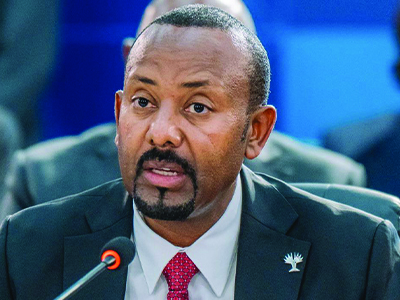
In-Picture | Apr 13,2025
The federal government has doubled overtime pays for thousands of drivers employed in the public sector as inflation eats into their salaries.
Mekuria Haile (PhD), head of the Civil Service Commission, told the administrators of 185 federal agencies last week about the adjustment made on overtime pays.
Mekuria was appointed to head the Commission last year, replacing the veteran Bezabih Gebreyes. He had previously served as a minister of Urban Development and Executive Director of the Ethiopian Policy Studies Institute. Studied his doctoral degree in South Korea, Mekuria also served as a general manager of the Addis Abeba city administration.
Mekuria’s recent decision to pay drivers more comes three years after the Council of Ministers issued a regulation granting his office the authority to adjust the overtime compensation rate. Chauffeurs assigned to senior officials have seen overtime pay increase to 1,500 Br a month, while compensation for other drivers is 200 Br less. An estimated five percent of Ethiopia’s 1.3 million civil servants are employed as drivers.
The federal government spends one percent of its budget on public service wages. However, drivers are among the least paid civil servants. First entry salaries stand at nearly 2,300 Br, and chauffeurs are entitled to 600 Br a month in per diem payments.
Alemu Deribe, 54, has worked as a driver for three federal agencies over the past three decades. A father of four, who earns a 4,600 Br monthly gross salary, Alemu is assigned to chauffeur a senior advisor at the Ministry of Culture & Sports, under Kejella Merdassa.
Paying overtime compensation to the civil service, including drivers, is uncommon in most public institutions. Forty-one of the 767 employees working for the Ministry of Justice are drivers. They rarely receive overtime pays, according to Nigussie Tenkolu, director of human resources.
“The recurrent budget allocated to the Ministry is limited,” said Nigussie.
The federal government has earmarked 615 million Br for the Ministry’s recurrent expenditure this year, accounting for over a third of the budget.
Gideon Befekadu, finance director at the Ministry of Water & Energy, tells the same story. Only chauffeurs assigned to senior officials receive overtime pay, Gideon told Fortune.
“We should be paid overtime just like any other civil servant,” said Alemu.
Alemayehu Mengistu, head of the commissioner’s office, concedes overtime pays for public service employees is inadequate to cover the runaway cost of living. It is also subject to income tax.
“It’s better than nothing,” he said.
The Civil Service Commission has also raised the ceiling for overtime hours civil service employees are allowed to work by more than a quarter to 80 hours a month. A workweek is set at 39 hours - any work performed beyond this limit is considered overtime. Unlike drivers, other civil service employees receive overtime pay for extra work hours.
Civil service staff who work overtime are entitled to receive 125pc of their regular hourly rate for overtime work between 6am and 10pm. The compensation rate increases to 150pc for overtime work between 10pm and 6am. They will be paid double the standard on weekends, while the rate is 250pc on public holidays.
Despite the increased hours, Gideon says the budget allocated to the Ministry is insufficient to cover compensation for employees other than drivers. The Ministry of Water & Energy has a recurrent budget of 423 million Br for this fiscal year. It has been allocated 8.3 billion Br for capital spending.
Chala Abdessa, a public administration lecturer at Addis Abeba University, observes a strong relationship between incentives and productivity. He says the lack of funding for overtime pay could be a discouraging factor.
“Despite a high proportion of money spent through state channels, there are limited incentives for civil servants,” said Chala.
It has been eight years since civil servants enjoyed a salary raise. Wage stagnation is in sharp contrast to the skyrocketing cost of living. Headline inflation in last month’s consumer price index registered 34pc, marking 11 consecutive months above the 30pc threshold.
The double-digit inflationary pressure in the economy hits civil service workers and their families the hardest. Average inflation over the past 12 months reached 20pc. Half of all civil service workers receive salaries between 1,500 Br and 3,000 Br.
Officials say they are working to adjust per diem pay to help them cope with the cost of living.
However, the expert argues this measure is meaningless in the face of galloping inflation.
“Although the government has introduced a range of civil service reforms to raise productivity, a lack of motivation persists in the public sector,” said Chala.
PUBLISHED ON
Jul 30,2022 [ VOL
23 , NO
1161]

In-Picture | Apr 13,2025

Fortune News | Oct 24,2020

Radar | Oct 12,2025

Radar | Jun 12,2023

Radar | Oct 05,2019

Verbatim | Oct 20,2024

Fortune News | Apr 12,2020

Editorial | Mar 13,2021

Verbatim | Aug 02,2025

Commentaries | Apr 26,2025

Dec 22 , 2024 . By TIZITA SHEWAFERAW
Charged with transforming colossal state-owned enterprises into modern and competitiv...

Aug 18 , 2024 . By AKSAH ITALO
Although predictable Yonas Zerihun's job in the ride-hailing service is not immune to...

Jul 28 , 2024 . By TIZITA SHEWAFERAW
Unhabitual, perhaps too many, Samuel Gebreyohannes, 38, used to occasionally enjoy a couple of beers at breakfast. However, he recently swit...

Jul 13 , 2024 . By AKSAH ITALO
Investors who rely on tractors, trucks, and field vehicles for commuting, transporting commodities, and f...

Oct 11 , 2025
Ladislas Farago, a roving Associated Press (AP) correspondent, arrived in Ethiopia in...

Oct 4 , 2025
Eyob Tekalegn (PhD) had been in the Governor's chair for only weeks when, on Septembe...

Sep 27 , 2025
Four years into an experiment with “shock therapy” in education, the national moo...

Sep 20 , 2025
Getachew Reda's return to the national stage was always going to stir attention. Once...